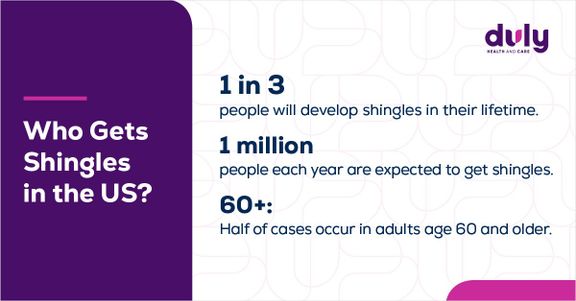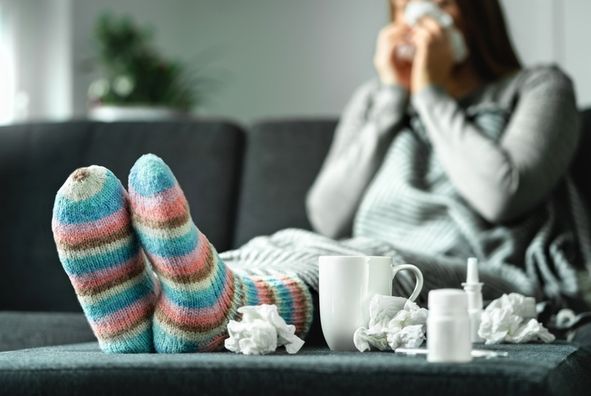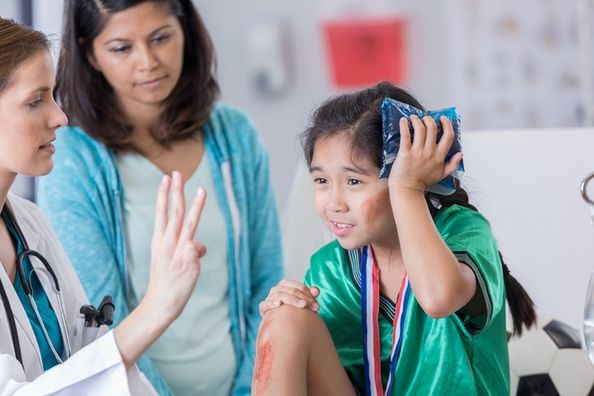If you watch late-night television, chances are, you’ve seen at least one commercial for the shingles virus, with someone urging you to talk to your provider about getting vaccinated.
It might be annoying to see these commercials over and over, and you may feel like they’re getting more airtime. That’s probably because, in the US, shingles rates are on the rise.

Shingles is a viral infection that causes a painful skin rash. If you’ve had chickenpox, that same virus (varicella-zoster) is reactivated to cause shingles. The chickenpox virus remains in some of your nerve cells long after you’ve recovered.
If you’re under 50 years old, shingles might not be something you’ve begun to worry about yet — but knowing what it is and why prevention is important can help protect you and your aging loved ones.
How Do I Know If I Have Shingles?
Shingles is a disease that can cause rashes on your body. These rashes often form around your waist, face, or body. The rash typically covers a small area and will occur on one side of your body (like only on the right side or only on the left side).
Getting a rash from shingles can be everything from itchy and annoying, to painful and burning. For most adults, the virus stays inactive and it never leads to shingles. But, for about 33% of adults, the virus will become active again and cause shingles.
In addition to a rash, you might also experience the following shingles symptoms:
Blisters
Itching, tingling, or numbness in your skin
Burning or shooting pain
Fever or chills
Upset stomach, headache, chills, or fever
If you are experiencing shingles symptoms, call your Duly provider right away. Shingles usually clears up in less than a month, and you have multiple options for antiviral medications that can make your shingles less intense and last for less time. These medications are most effective the earlier you start taking them, so reach out to your provider as soon as you notice shingles symptoms or rash.
What Else Can I Do to Lower My Risk For Shingles?
If you are over 50 years old, the best way to lower your risk of getting shingles is to get your shingles vaccine.* The CDC-recommended vaccine for shingles is called Shingrix, and it comes in two doses.
Getting the 2‑dose shingles vaccine can reduce your risk of getting shingles — it’s over 90% effective at preventing the disease for most healthy adults aged 50 years and older.
*Previously, the vaccine for shingles was Zostavax — which has since been discontinued in the US. Even if you got the Zostavax vaccine, the CDC also recommends that you get the Shingrix vaccine.
If you are over 50 years old, schedule a visit with your Duly provider today to get your shingles vaccine.
What’s the Connection Between Shingles and COVID-19?
In the wake of the pandemic, many people now wonder about how certain conditions connect to or might be affected by COVID-19. Shingles is no different.
There are two main questions you may have about shingles risk and COVID-19:
Does the COVID vaccine cause shingles?
Does COVID itself cause shingles?
When it comes to the COVID-19 vaccine, recent studies have shown that getting the vaccine does not increase your chances of getting shingles. What can impact your risk of getting shingles, however, is getting COVID-19.
The connection between the two conditions isn’t clear, and a COVID-19 infection does not cause you to get shingles. While COVID-19 causes symptoms like fever, muscle aches, and difficulty breathing, it does not cause you to break out in a shingles rash.
What COVID-19 does is lower your immune system’s ability to fight off infections — and one potential trigger for shingles is a weakened immune system. COVID-19 is not going to turn into shingles, but it can set the scene for shingles to make an appearance more easily. The COVID-19 vaccine is a safe and effective way to lower your risk of getting COVID-19.
Protecting Yourself and Your Loved Ones From Shingles
If you haven’t turned 50 yet, shingles may not be something that’s on your mind. While you may have a few more years before scheduling your shingles vaccine, you may have an aging loved one who should get vaccinated.
Check-in with your older parents or loved ones to see if they have gotten their vaccine. They may not realize it’s time or not know they should get the new Shingrix vaccine even if they already got the Zostavax vaccine.
With your support, they can be protected from shingles after two easy appointments, allowing them to age in good health.
Health Topics:







